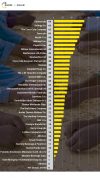Bali Process Business Leaders in top quartile of 2018 Food and Beverage Benchmark
KnowTheChain’s 2018 Food and Beverage Benchmark results are in.

From tea pickers on isolated tea estates to laborers on remote cocoa farms and rice mills, workers in the agricultural sector are particularly vulnerable to exploitation. Driven by a growing demand for fuel, food, and raw materials the sector increasingly pushes agricultural work into more rural areas to accommodate its land-intensive activities,[1] exacerbating the remote nature of the work and putting workers at greater risk. To better understand what companies are doing to address the risk of forced labor in their food and beverage supply chains, KnowTheChain evaluated 38 of the largest global companies on their forced labor policies and practices.
2018 Food and Beverage Benchmark Findings Launched
Launched in October 2018, the Food and Beverage Benchmark Findings Report finds that while many of the companies evaluated have policies and commitments in place, the majority do not provide evidence of those policies in practice. Ranked across seven benchmark themes, companies scored the lowest on worker voice and recruitment, indicating that little or no action is taken to listen to, engage with, or empower workers across company supply chains.
This year, Kellogg surpassed both Coca-Cola and Nestlé, securing the second highest score behind Unilever who remains the top scoring company since KnowTheChain’s first food and beverage sector benchmark in 2016. Notably, though Coca-Cola has improved its practices[2] and remains a top scoring company, both FEMSA and Monster, two companies in Coca-Cola’s supply chains, are among the lowest scoring companies with scores below 10 out of 100.
While the majority of companies have improved their disclosure and practices since 2016, the average score across the benchmark remains low at 30 out of 100, indicating that companies need to take further action to address forced labor risks across all tiers of their supply chains.
“Forced labor remains a major problem in the production of popular food and beverage products,” said Kilian Moote, project director for KnowTheChain. “While it’s encouraging to see some companies making additional commitments since the 2016 benchmark, progress for workers is not moving fast enough. Companies across the board must do better to make demonstrable improvements for workers.”
Bali Process Business Leaders in the top quartile
Congratulations to our Bali Process Business Leaders who all ranked within the top quartile, including:
- 1st – Unilever (Global Business Partner), developed grievance mechanisms for palm oil supply chain, scored highly on recruitment and worker voice
- 5th – Nestle (Global Business Partner), improved by disclosing list of palm oil suppliers, scored highest on traceability and risk assessment
- 6th – Walmart (US Business Leader and Global Business Partner), scored twice as high as its peers on the theme of purchasing practices
- 8th – Wilmar (Singaporean Business Leader), scored highest on the theme of remedy
- 9th – Wesfarmers (Australian Business Leader), discloses wages and conditions hotline to farm and factory workers in its supply chain
- 10th – Woolworths (Global Business Partner), commits to undertake risk assessment across all levels of its supply chain
Other Key Findings for Food & Beverage Sector
- We urge companies to engage with workers, give them access to effective grievance mechanisms, and tackle the exploitation of migrant workers by implementing ethical recruitment practices
- From the tomatoes in our salad to the coffee we drink every day, the food and beverages we consume could be produced with forced labor.
- The food & beverage sector is at risk of forced labor. Workers in the agricultural sector tend to be isolated in remote work environments like farms or boats and are particularly vulnerable to exploitation.
- The increasing global demand for food and raw materials pushes agricultural work into more rural and isolated areas, exacerbating the risk for exploitation.
- Workers’ rights to organize have also been suppressed in agricultural supply chains. Oxfam reports that less than a quarter of food suppliers noted the presence of trade unions in a survey of 1,500 companies in global supply chains.
- Over time, eating organic food has become increasingly popular, but is the food we consume being produced ethically?








References:
[1] Business & Human Rights Resource Centre and International Service for Human Rights (2018), “Shared space under pressure: business support for civic freedoms and human rights defenders”, p. 68. See also Global Witness (2017), “At what cost? Irresponsible business and the murder of land and environmental defenders in 2017”, p. 43.
[2] This is because the company discloses that it is co-chairing the work stream on responsible recruitment of the industry initiative AIM-PROGRESS, which involved awareness raising on this topic among suppliers and industry peers. It further discloses that it trained suppliers in different countries on forced labor and responsible recruitment.




